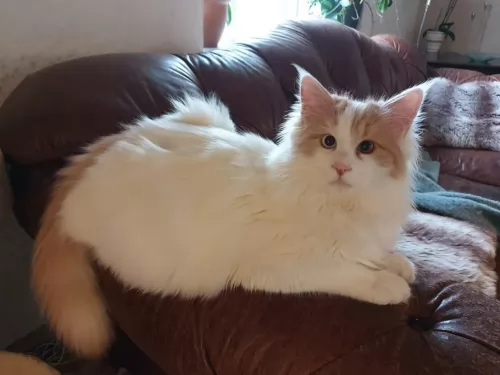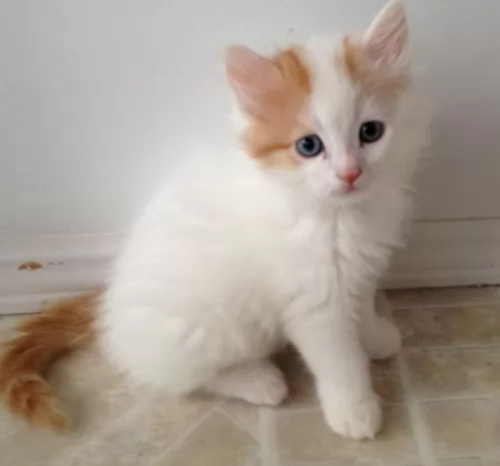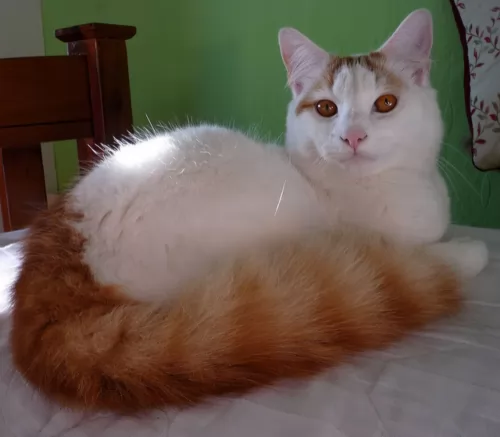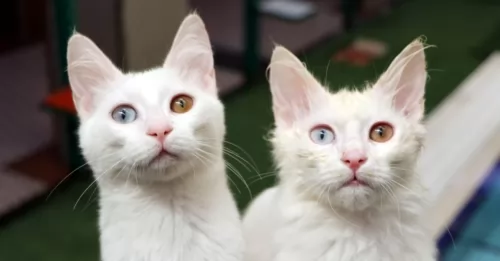Stone Cougar is originated from Egypt but Turkish Van is originated from Turkey. Both Stone Cougar and Turkish Van are having almost same weight. Both Stone Cougar and Turkish Van has almost same life span. Both Stone Cougar and Turkish Van has same litter size. Both Stone Cougar and Turkish Van requires Low Maintenance.
Basic Information
Life Span:
12 - 16 Years
12 - 15 Years
Other Names:
Mountain Cougar, Chausie
The Swimming Cat
Colors Available:
Light fawn color
brown, White with other colors - red, black
Coat:
Short. coarse and thick
Semi long haired
Temperament:
Affectionate, Alert, Cheerful, Curious, Energetic, Friendly, Independent, Intelligent, Lively, Loving, Loyal, Outgoing, Playful, Responsive, Social, Territorial
Affectionate, Alert, Cheerful, Curious, Energetic, Friendly, Independent, Intelligent, Lively, Loving, Loyal, Outgoing, Playful, Protective, Responsive, Social, Sweet, Territorial
Grooming:
Low Maintenance
Low Maintenance
New Owners Friendly:
Yes
Yes
History
Once again the Stone Cougar, also referred to as the Mountain Cougar or Chausie, is a cat that was developed to resemble a wild cat but that is actually a domestic cat.
The Stone Cougar is a rare domestic cat that is a cross between a domestic cat and the wild Jungle cat. It is referred to as a wildcat hybrid.
 Hailing from Turkey, the Turkish Van was brought to the UK in 1955 by 2 British women, Laura Lushington and Sonia Halliday.
Hailing from Turkey, the Turkish Van was brought to the UK in 1955 by 2 British women, Laura Lushington and Sonia Halliday.
These cats were used as the foundation stock of the breed. They were brought to the United States in 1982 and accepted into championship with the Cat Fanciers’ Association in 1994.
They are a very rare breed and no other breed is allowed to be mixed into the cat's breeding schedule. All registered Turkish Van cats can have their ancestry traced back to the imported cats of Laura Lushington.
Description
The Stone Cougar cat is thick-set with a thick tail. They are large cats too and can be anything between 7 and 13kg.
The ears are small. The color’ stone’ is used to describe the color of this cat – a light fawn color. These cats can be a lot bigger than your regular cat and they are also referred to as Mountain Cougar or Jungle Curl. Because they are bigger than most domestic cats, they can take up to 3 years to reach maturity.
Temperament:
This is an active cat that is intelligent and adventurous. People who have kept this social cat as a pet say that he is trainable and also dog-like and even enjoys playing in water.
Like many other hybrid cats, the Stone Cougar can have some endearing characteristics that tend to make it quite different from your regular cat.
 This is a medium to large-sized cat weighing roughly 3 to 8kg. It’s a semi-long-haired domestic cat breed that was actually developed in the United Kingdom with a selection of cats from Turkey.
This is a medium to large-sized cat weighing roughly 3 to 8kg. It’s a semi-long-haired domestic cat breed that was actually developed in the United Kingdom with a selection of cats from Turkey.
The breed is distinguished by the Van pattern where the color is restricted to the head and tail. So the cat is white with color on the head and the tail. The Turkish Van has no undercoat and the cat has a sleek appearance.
The cat is quite long and its back legs are slightly longer than its front legs. The paws are large and they are strong jumpers.
Temperament:
These cats are playful, active, and independent and they are also excellent hunters. They are affectionate and form strong bonds with their human families.
They get on well with kids as well as with other pets. Energetic and agile, they love to leap up onto high places. For a cat, they also have this fascination with water and may well follow their human into a swimming pool or lake.
Characteristics
When it comes to bringing a Stone Cougar into your home, you need to be well prepared for such a large cat.
They are also very energetic and you may be overwhelmed by his darting around. It is why so many of these hybrids land up in shelters – people don’t believe that they are different from your regular domesticated cat.
Nonetheless, they can make loving pets and they like lots of attention too. Don’t just get a Stone Cougar because it is an exotic cat. Think carefully if you are ready to be totally devoted to the cat for 12 – 16 years possibly.
 Lively, social, and intelligent, the Turkish Van is going to make you a wonderful pet and companion.
Lively, social, and intelligent, the Turkish Van is going to make you a wonderful pet and companion.
He is an active cat and will require you to play with him and provide some form of exercise for him.
He likes to leap up onto perches so getting him a climbing tree will serve him well as he is a cat that loves perching on high up places.
These cats are also low maintenance which simply adds to them being such perfect pets for single people, couples, families and seniors, just so long as he is provided with lots of love and care.
Health Problems
The Stone Cougar is a fairly healthy cat and you aren’t going to have to worry about heavy vet bills if you look after him well.
Remember that just like with humans, the health of a cat depends heavily on the food you give him. It needs to be high-quality food.
Obesity is something you want to always watch out for as it can bring on a host of ailments of which joint problems and arthritis are ones to look out for.
Always get vet help for your Turkish Van if you notice these signs -
Discharge or redness of the eyes
Scratching or shaking the head
Battling to urinate
Extreme and ongoing lethargy
Heavy breathing
Have your cat vaccinated against the deadly cat diseases there are.
Have your cat spayed or neutered.
 Your Turkish Van counts on you to ensure his health and wellbeing. This will ensure he lives a long and healthy life.
Your Turkish Van counts on you to ensure his health and wellbeing. This will ensure he lives a long and healthy life.
Obesity is a major disease that contributes to many illnesses in cats. Excess weight is one of the factors for the development of arthritis and diabetes as well as some life-threatening diseases.
All kinds of parasites can invade your Turkish Van’s body. . Many types of parasites can be detected with a fecal exam, so a trip to your vet may be necessary.
Caring The Pet
The Stone Cougar is easy to take care of in terms of grooming as it has a short coat. You want to brush the short coat at least once a week to remove dust and loose hairs. It isn’t a heavy shedding cat.
Keep his nails short. Invest in a scratching post for him as all cats are natural scratchers.
As also mentioned, the Stone Cougar is a large cat and the correct diet is of the utmost importance. There are some cat owners who like to prepare their cat’s food, but then you just have to be 100% sure that he is getting in all the vital nutrients he requires for health.
The best, most high-quality commercial cat food manufacturers make sure that the cat food they manufacture is packed with everything a cat needs, with meat being the top ingredient. Remember, when in any kind of doubt with your Stone Cougar’s diet, rather speak to your vet.
The Stone Cougar is prone to food allergies, and it is for this reason that you will need to provide these cats with a high-quality diet.
Make sure you read the labels carefully because you want to avoid some of the junk additives added into some of the more inferior cat foods. They can often be prone to digestive issues.
The Stone Cougar is an active cat and he will need to be well exercised. Such a large cat will require en outside enclosure where he can run, jump and climb without fear of him getting out and running away.
If you don’t have an outdoor enclosure, the next best thing is to train him to walk on a leash.
Unless you intend to be breeding, be sure to spay or neuter your Stone Cougar.
 One of the most important things with a cat is diet. The cat is a carnivore. Watch his diet, and make sure he gets plenty of meaty food.
One of the most important things with a cat is diet. The cat is a carnivore. Watch his diet, and make sure he gets plenty of meaty food.
Check with your vet if you aren’t sure how to feed your cat. There must always be a constant supply of fresh, cool water available and both food and water bowls must be washed regularly.
Regularly brush your cat’s coat gently and at the same time check the body over for any unusual lumps. If you discover a new lump, get your cat to the vet.
Be sure to schedule in your cat’s vaccinations as without these your cat can die from some of the more dangerous ones.
Another wise move, if at all possible, is to sign up for pet health insurance as then you won’t dread it financially when your vet requests medical tests be done on your cat.
There are simple things you can do to ensure the longevity of your beloved cat. Good food, exercise, fresh water, and plenty of love and attention.
Turkish Vans can have problems with their teeth. Teeth brushing can be massively traumatic and uncomfortable for your pet, but the best diet and vet care will ensure healthy teeth.
Have the nails trimmed.
Cats are meticulous about hygiene so ensure the litter box is kept clean. Remove the cat’s feces every single day.
Comparison with other breeds
- Turkish Van vs Abyssinian - Breed Comparison
- Turkish Van vs Aegean - Breed Comparison
- Turkish Van vs African Serval - Breed Comparison
- Turkish Van vs Chausie - Breed Comparison
- Turkish Van vs American Bobtail - Breed Comparison
- Turkish Van vs American Curl - Breed Comparison
- Turkish Van vs American Keuda - Breed Comparison
- Turkish Van vs American Longhair - Breed Comparison
- Turkish Van vs American Polydactyl - Breed Comparison
- Turkish Van vs American Shorthair - Breed Comparison
- Turkish Van vs American Wirehair - Breed Comparison
- Turkish Van vs Applehead Siamese - Breed Comparison
- Turkish Van vs Ashera - Breed Comparison
- Turkish Van vs Asian - Breed Comparison
- Turkish Van vs Asian Semi-Longhair - Breed Comparison
- Turkish Van vs Australian Mist - Breed Comparison
- Turkish Van vs Balinese - Breed Comparison
- Turkish Van vs Bengal - Breed Comparison
- Turkish Van vs Bicolor - Breed Comparison
- Turkish Van vs Birman - Breed Comparison
- Turkish Van vs Blue Russian - Breed Comparison
- Turkish Van vs Bombay - Breed Comparison
- Turkish Van vs Brazilian Shorthair - Breed Comparison
- Turkish Van vs Bristol - Breed Comparison
- Turkish Van vs British Longhair - Breed Comparison
- Stone Cougar vs Abyssinian - Breed Comparison
- Stone Cougar vs Aegean - Breed Comparison
- Stone Cougar vs African Serval - Breed Comparison
- Stone Cougar vs Chausie - Breed Comparison
- Stone Cougar vs American Bobtail - Breed Comparison
- Stone Cougar vs American Curl - Breed Comparison
- Stone Cougar vs American Keuda - Breed Comparison
- Stone Cougar vs American Longhair - Breed Comparison
- Stone Cougar vs American Polydactyl - Breed Comparison
- Stone Cougar vs American Shorthair - Breed Comparison
- Stone Cougar vs American Wirehair - Breed Comparison
- Stone Cougar vs Applehead Siamese - Breed Comparison
- Stone Cougar vs Ashera - Breed Comparison
- Stone Cougar vs Asian - Breed Comparison
- Stone Cougar vs Asian Semi-Longhair - Breed Comparison
- Stone Cougar vs Australian Mist - Breed Comparison
- Stone Cougar vs Balinese - Breed Comparison
- Stone Cougar vs Bengal - Breed Comparison
- Stone Cougar vs Bicolor - Breed Comparison
- Stone Cougar vs Birman - Breed Comparison
- Stone Cougar vs Blue Russian - Breed Comparison
- Stone Cougar vs Bombay - Breed Comparison
- Stone Cougar vs Brazilian Shorthair - Breed Comparison
- Stone Cougar vs Bristol - Breed Comparison
- Stone Cougar vs British Longhair - Breed Comparison
 Petzlover
Petzlover Hailing from Turkey, the Turkish Van was brought to the UK in 1955 by 2 British women, Laura Lushington and Sonia Halliday.
Hailing from Turkey, the Turkish Van was brought to the UK in 1955 by 2 British women, Laura Lushington and Sonia Halliday. This is a medium to large-sized cat weighing roughly 3 to 8kg. It’s a semi-long-haired domestic cat breed that was actually developed in the United Kingdom with a selection of cats from Turkey.
This is a medium to large-sized cat weighing roughly 3 to 8kg. It’s a semi-long-haired domestic cat breed that was actually developed in the United Kingdom with a selection of cats from Turkey. Lively, social, and intelligent, the Turkish Van is going to make you a wonderful pet and companion.
Lively, social, and intelligent, the Turkish Van is going to make you a wonderful pet and companion. Your Turkish Van counts on you to ensure his health and wellbeing. This will ensure he lives a long and healthy life.
Your Turkish Van counts on you to ensure his health and wellbeing. This will ensure he lives a long and healthy life. One of the most important things with a cat is diet. The cat is a carnivore. Watch his diet, and make sure he gets plenty of meaty food.
One of the most important things with a cat is diet. The cat is a carnivore. Watch his diet, and make sure he gets plenty of meaty food.